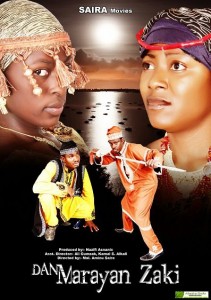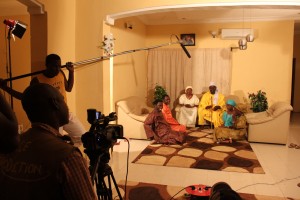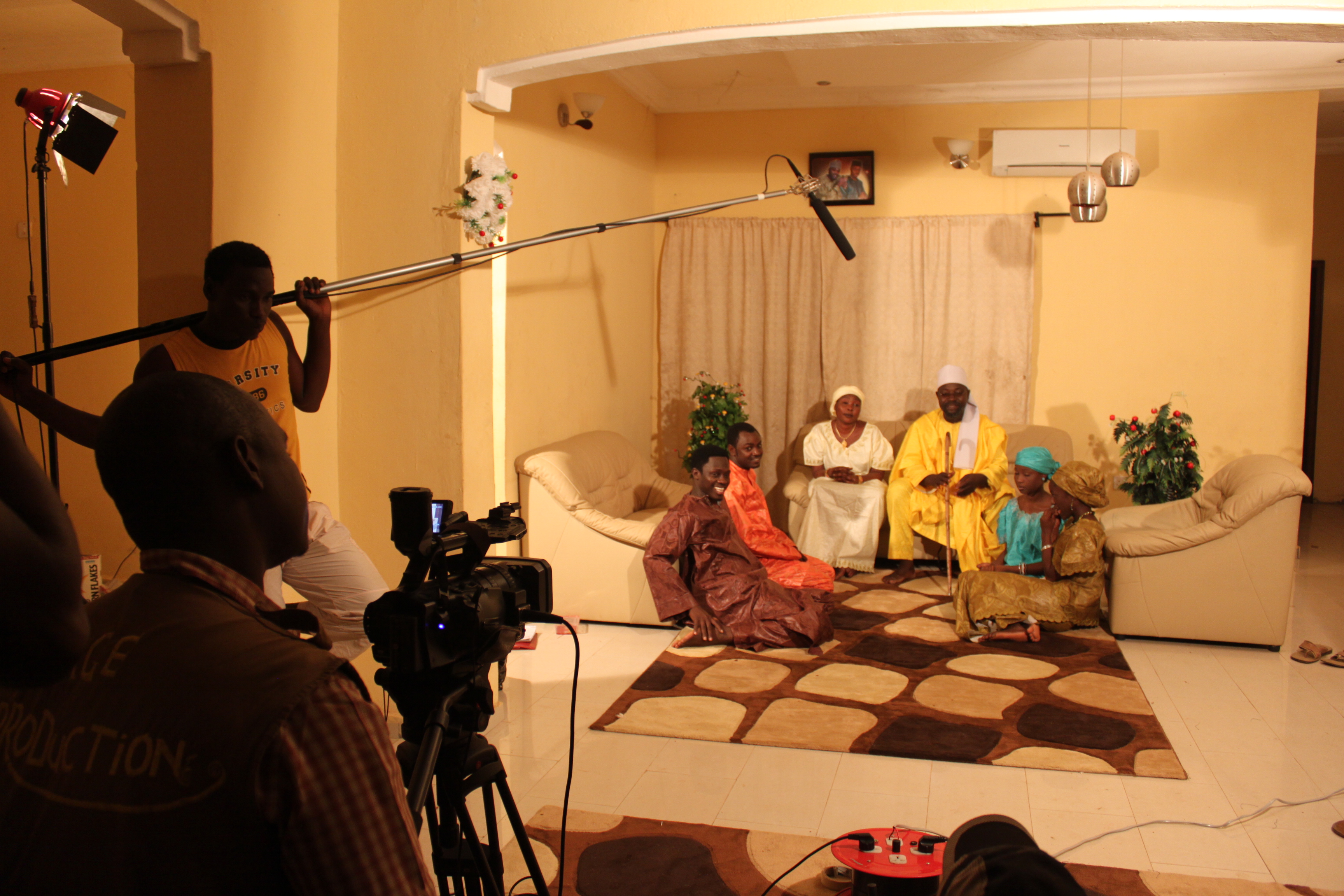The columnist this month is Carmen McCain
Recent statistics from the Nigerian National Film and Video Censor’s Board (NFVCB) show that of the 1,114 Nigerian films approved by the board in 2010, English-language films surprisingly made up only around 12%. By contrast, around 55% of the films were in Yoruba, and around 30% in Hausa. The rising numbers of Nigerian language films indicate that, despite the global media focus on English-films, Nigerian audiences seem to prefer productions in Nigerian languages. In 2010, DSTV opened Africa Magic channels in Yoruba and Hausa, and in 2011, Glo dropped English-language Nollywood stars Jim Iyke and Kate Henshaw as ambassadors and added two Yoruba stars, Kunle Afolayan, Odunlade Adekola, and one Hausa star Jamila Umar Nagudu, pointing to a realization, in the corporate world, of the importance of language-film celebrities.

Despite these numbers, Nigerian-language industries, particularly the Hausa industry, are often disparaged online.. After an earlier article I published in the Weekly Trust pointing out these numbers from the NFVCB, a commenter on the Nigerianfilms.com website said: “d Yoruba nd Hausa film makers are d cause of all these confusion. They’re bin unnecessarily petty n jealous of d Ibo filmmakers nd stars. Nollywood shld b one umbrella in Nig, there shld be notin lyk kanywood or yorubawood.” On another article about the first Hausa film to be made in India, all three of the comments were derogatory. One reader said “TO HELL WIT HAUSA BEASTS. Threat to naija. Who cares about their boring film?” Another wrote, “Abokis almajiris boko haram wan shoot their mad film for wer? LOL! Im sure is all about Murderers story line.” Forums about Nigerian films seem to have become the site where Nigeria’s most poisonous prejudices reveal themselves.
Ironically, the name Kannywood for the Hausa film industry was first coined in 1999 by Tauraruwa (Stars) magazine publisher Sanusi Shehu Danaji three years before the New York Times used the term “Nollywood” to refer to the Nigerian film industry “Since the Hausa film industry was centred in Kano,” he told me, he followed the model provided by Hollywood, using the term Kannywood for the entire Hausa film industry. “When we started hearing the name Nollywood,” filmmaker and novelist Bala Anas Babinlata told me, laughing, “We thought they had stolen the idea from us.” Indeed, rather than Kannywood separating itself from “mainstream” Nollywood, the etymology of these names and the numbers of productions point to a much more complex history of the various streams that make up the Nigerian film history.
Most scholars locate the beginning of the Nigerian film industry in the 1970s with the rise of theatre-launched Yoruba cinema. In the 1980s, when Babangida’s Structural Adjustment Programme made cost of film prohibitive, many Yoruba filmmakers transitioned to video. In a Nigeria Daily News interview, actor Yinka Quadri claimed that Kenneth Nnebue produced twenty-seven Yoruba-language films before his 1992 Igbo language Living in Bondage success that gave the video movement its first smash hit. Likewise, up north, Babinlata recalls that by the mid-1980s, drama group performances were being informally videoed. Director, scriptwriter and make-up artist Aliyu Shehu Yakasai tells me that the market for Hausa videos grew out of a demand for content dubbed from television and sold illegally by marketers who sold American and Indian films. As drama groups, who were not being paid well by television, saw how Hausa television dramas were selling, they began to make their own films for sale on video. The first commercially successful video film was in 1990 with Turmin Danya produced by the Tumbin Giwa Drama group. Tumbin Giwa also produced the hit Gimbiya Fatima in 1993, which spread from Kano to Jos to Niamey. The Hausa film industry, then, grew parallel to the English language industry, rather than out of it. The films, much like the Hausa novels many were adapted from, told stories of social life in Northern Nigeria. Though there are well-developed genres of comedy and political drama, Kannywood is most known for its love stories and domestic dramas.
By the end of the 1990s, a new wave of youth like Ali Nuhu and Sani Danja had entered the film industry and, although earlier films

such as USA Galadima’s 1995 National Film Corporation supported film Soyayya Kunar Zuci had been adapted from Indian films, many cite the 1999 hit film Wasila, as making popular the now-characteristic “Indian” look of Hausa films. From the late 1990s till present most Hausa films include Indian-style song and dance sequences. The singing and dancing was so much in demand that producers began to complain that films would not sell without them. This gave rise to a new music industry in northern Nigeria based on film music. As in India, film singers became music stars, releasing their own bestselling video cd albums. The films and especially the songs and dances were the source of great anxiety to conservative critics, who believed that the films were introducing alien influences to audiences.
After shari’a law was instituted in Kano in June 2000, the government announced in December 2000 a ban on filmmaking in the state. In order to save their livelihood, the filmmakers themselves introduced the idea of a “review board” as a way to assure the government and conservative critics that that religious interests and culture would be protected. The Kano State Censorship Board (KSCB), an entity completely separate from the NFVCB, was founded in February 2001.
The relationship between the government board and the film industry progressed fairly smoothly until August 2007, when a sex scandal shook Kano. A private phone video of a Hausa actress having sex with a lover, was leaked and spread quickly through illicit Bluetooth transfers. Although the phone video had been made privately and had no relation to the industry, it was called the first Hausa ‘blue film’ and seemed to confirm public fears about filmmaking.
In response to the sex scandal, newly appointed executive secretary of the KSCB, Abubakar Rabo Abdulkarim, formerly deputy commandant of the hisbah,shari’a police, took a harsh interpretation of the censorship law that earlier censorship regimes had only mildly enforced. From 2007-2011, thousands of people employed by the film and entertainment industry were arrested and fined or served prison sentences, including directors, actors, singers, editors, marketers, video viewing centre owners, and video gaming centre employees.
The severe penalties filmmakers and marketers suffered for ostensible violations of the censorship, as well as requirements like having to pass a script through the censorship board before shooting or individual registration with the board, led many of them to flee Kano state, moving film productions to already established film hubs in Kaduna, Jos, and Abuja. Although many filmmakers continued to take their works to the KSCB so that they could access the powerful Kano market, others refused to register, identifying themselves as “Nigerian filmmakers” and using their certificate from the NFVCB to bypass the KSCB. After the arrests began, such films were generally labeled ‘not for sale in Kano’ and if found in Kano were known as ‘cocaine’. Ironically, the effect of this exodus of filmmakers had the effect of opening up the Hausa film industry to the larger world of filmmaking in Nigeria, what Kannywood/Nollywood star Ali Nuhu recognized, in a Weekly Trust interview, as a “blessing in disguise”. In 2011, the censorship crisis was largely resolved when a Rabi’u Kwankwaso, governor when the KSCB was first formed in 2001, was voted back in. He re-appointed as executive director of the censorship board the man who had originally headed the board.

Now in 2012, the Hausa film industry is stronger than ever. Among the most popular directors is Aminu Saira, who with partners like scriptwriter and producer Nasir Gwangwazo or musician and producer Nazifi Asnanic, produce hit after hit. Falalu Dorayi is also a director to watch for. One of the best Hausa films I have seen is Dorayi’s 2011 Zarar Bunu based on Nazir Adam Salih’s 2003 thriller novel Linzamin Shaid’an. And while Hausa filmmakers often complain that unlike the investment of a Southern elite in Nollywood, few northern elite have become involved in Kannywood, there are a couple of bankers who have begun producing films. Former banker Aisha Halilu founded Kumbo Productions and has become a major force in the Hausa film industry, beginning with her hit film Sanafahna in 2006 and continuing with films like Gudun Kaddara, Duniyar Mu, Makuwa, and Noor. Her films have an attention to detail that was missing from many earlier Hausa films. In 2010, banker Muhammad Dahiru, owner of the Jos-based company 3sp International, released the beautifully shot film Hamza, set during the pre-colonial days of the slave trade. He told me he shot the film in English and featured a cast from both Nollywood and Kannywood to “sell our culture” to the nation. Jos-based marketer Aminu Hudu Ilyasu told me that the film had not sold as well in the north as it had in the south, speculating that it was because the film was in English. But Dahiru insists that, although according to his research the Hausa film market is more profitable than the southern industry, “I didn’t do Hamza for the north, I did it for the whole country, and I’m glad the southern part of the country has accepted it.” Dahiru is also behind the Savannah International Film Awards which he focused on Kannywood to promote the industry. Dahiru has great hopes for the future, telling me that foreign filmmakers had told him, “You are using one camera to shoot, and you are coming up with this? You are doing a wonderful job. What if you have all the required facilities, then you will do more than what some of us are doing over there.” His dream is to see northern Nigerian films in mainstream cinemas all over the world. And with the rise of the “new Nollywood” cinema in the south, that is, perhaps, not far off.
–
Carmen McCain first moved to Nigeria from the United States in 1988 with her parents. She is currently a PhD Candidate in the Department of African Languages and Literature at the University of Wisconsin, Madison and lives in northern Nigeria. She writes a Saturday column for the Weekly Trust and maintains the blogs http://carmenmccain.wordpress.com and http://hausahomevideoresourcecentre.wordpress.com


